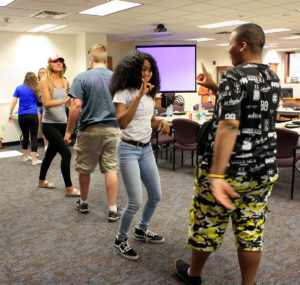Prioritizing Student Well-Being
As part of our Foundation For Excellence plan, district leaders and teachers are placing much importance on the Student Learning & Well-being and Personal Connections & Collaboration compass points. Through strong relationships, solid networks of trust, and more awareness training, staff can identify students who may be struggling to be the best, most true version of themselves.
Some of these efforts are new programs that will start with the 2016-17 school year. If students or parents have questions related to these well-being initiatives, they are encouraged to contact their school’s guidance counselor(s).
School-based Mental Health Therapists
This fall, the three secondary schools will welcome two mental-health therapists from outside organizations into their buildings. The five elementary schools will also house two therapists. These positions are in addition to the school counselors in the buildings – five at Johnston High School, two at Johnston Middle School, two at Summit Middle School, and one at each elementary.
“Housing therapists within our school buildings allows students greater access to this kind of help,” said Bruce Amendt, JCSD Associate Superintendent. “It also works better with a student’s schedule and reduces the logistics that have to be made for a parent to leave work and pick up a student for an appointment.”
Amendt went on to explain that all therapy services must be approved by a parent before a student can begin. The services are not free and would be paid for through insurance or out-of-pocket. Financial assistance may also be available for families who qualify.
The district reached agreements with Orchard Place and Youth Homes of Mid-America for the secondary and elementary therapists, respectively. Amendt said both companies have experience providing mental health support to students of all ages and levels of need.

A group of JHS students participated in mental health and well-being training last spring in efforts to open up conversations among their peers regarding the importance of mental health.
Youth Mental Health First Aid Training
The Youth Mental Health First Aid Training originated in Australia as a program for adults and was quickly adapted to fit youth and their developing minds. The program has gained momentum around the world as a way for trained professionals to help youth through crises related to anxiety, depression, substance abuse, eating disorders, and more.
Johnston High School school counselor Lisa Boge completed the training during the 2015-16 school year and is now a trainer for others in the district.
“My vision is to get all Johnston staff trained in Youth Mental Health First Aid,” Boge said “We simply have to be ready to identify and treat mental health and well-being issues.”
Boge said much time was spent during the 2015-16 school year to lay the groundwork for larger-scale staff trainings and prioritize the services offered to students in coming years.
Creating Cultures of Support
All too often, a blanket of silence surrounds conversations and awareness of adolescent mental health and well-being. A group of Johnston High School students sought to change all that when they reached out to Chris Wilson, District Prevention Coordinator, to discuss ideas for change. That’s when they came up with the idea of reaching students through a medium they already use.
2016 graduate Wyatt Schmitt, along with some of his friends, created the JHS Students For Change Twitter account (@jhsS4C) to reach students on a common platform.
“The goal is to tweet out helpful links, encouragement, and challenges,” said Schmitt. “I hope it inspires everyone to try new things and meet new people, and that we get to see the responses.”
Schmitt and the other students and staff involved have been trained on how to talk about mental health. The project is student-run with staff oversight and covers all high school levels.
“We’re helping break down the stigma on mental health by giving students a place to talk,” said Schmitt. “I think this is needed everywhere, for everyone. It would be awesome to see the account become successful and expand outside of Johnston.”
Wilson said the group shares a common desire to help each other and make JHS more welcoming.
The Twitter account is just one example of Johnston students working to create a culture of support in school. According to Wilson, the high school is also planning to implement an iPad app to aid student well-being. “A Friend Asks” is an app from the Jason Foundation that provides students with resources to help each other. The app also connects the user directly with the suicide lifeline.